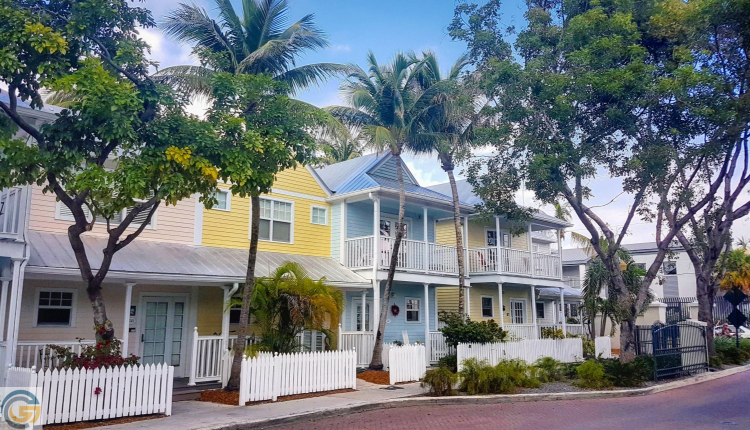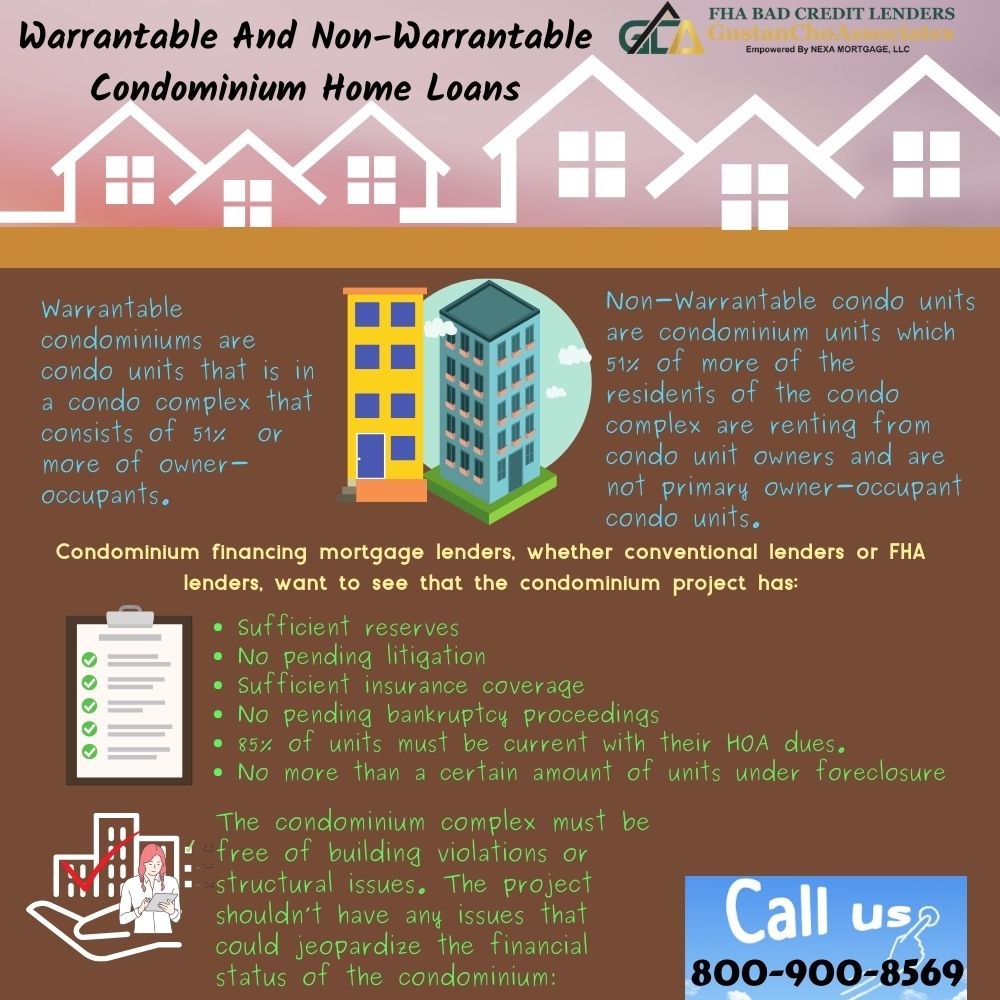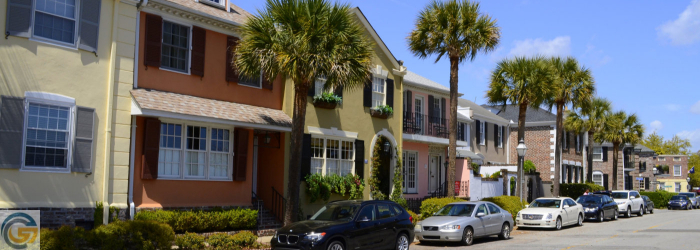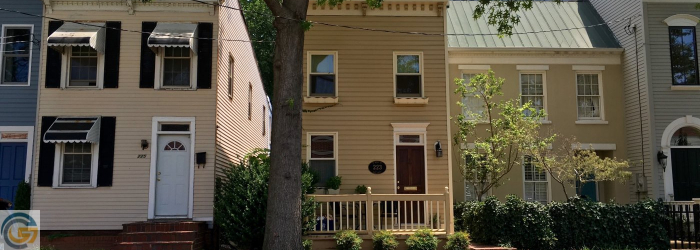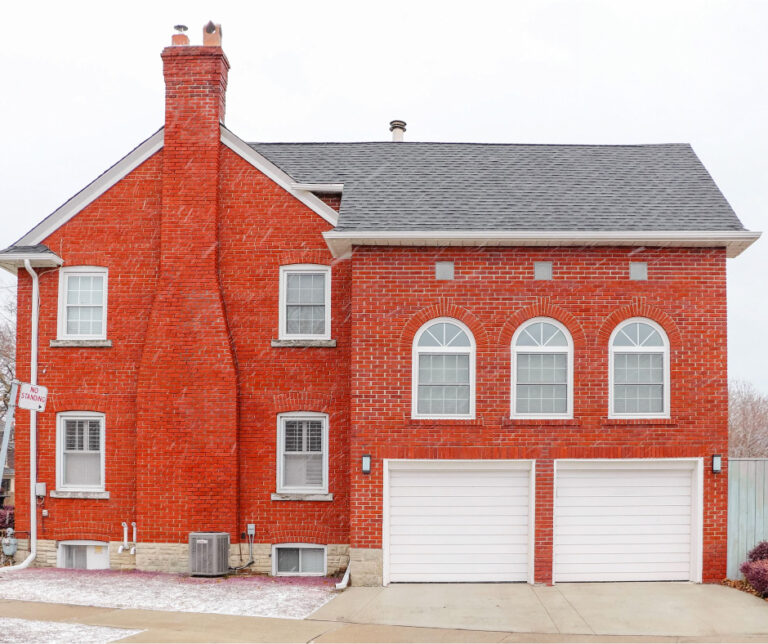Warrantable and Non-Warrantable Condominium Home Loans
This article covers warrantable and non-warrantable condominium home loans. Many first-time home buyers purchase a condominium unit to avoid the responsibility of maintaining a home. But this simple decision could affect their financing options. A condominium borrower might be fully qualified for a single-family home loan but may not qualify for condominium financing.
The reasons are twofold: Lender guidelines on condominium home loans are rather strict, and there are more requirements to meet. Warrantable condominium home loans are traditional mortgage loans requiring zero to 5% down payment. Non-warrantable condominium home loans are non-QM alternative loan programs that are portfolio loans that require a 20% or higher down payment.
Condominium financing has more layers of risk for the mortgage lender due to the condo complex. Not only does the lender underwrite the condo unit, but the financial health of the condominium complex also needs to be taken into consideration as well. In the following paragraphs, we will cover warrantable and non-warrantable condominium home loans and traditional and non-conforming condominium home loans.
What Is The Difference Between Warrantable Versus Non-Warrantable Condominium Home Loans
Condos are considered riskier assets than single-family homes by mortgage lenders. The financing process is more complicated as well. To approve financing for a condominium, the lender needs to underwrite the borrower and the condo complex.
Warrantable condominiums are condo units that is in a condo complex that consists of 51% or more of owner-occupants. Non-Warrantable condo units are condominium units which 51% of more of the residents of the condo complex are renting from condo unit owners and are not primary owner-occupant condo units. HUD, VA, USDA, Fannie Mae, and Freddie Mac do not finance non-warrantable condo units. Condotels are non-warrantable condos and do not qualify for warrantable condominium home loans.
It’s actually quite common that a condo complex doesn’t qualify, even though a borrower does. Here are some additional items lenders review for condos that don’t apply to single-family homes:
- Condo complex financials
- Reserves and financial condition of the condo complex
- Recent comparable sales
- Building condition
- Occupancy rate
- Foreclosure rates
- Whether the condo project is FHA-approved or not
Appraisals on Condominium Home Loans
There are cases where a lender doesn’t approve a condominium loan because the condominium project has no recent sales comparable to the subject unit. The lender will not accept comparable sales outside the condo project unit; it has to be comparable from within the condo project.
Before condo buyers go out and enter into a condominium purchase contract, they should make sure that condominium financing is in place. The borrower needs to choose a lender with little or no overlays on condominium financing.
A substantial amount of clients contact FHA Bad Credit Lenders when they are about to close on their condominium units. It usually happens at the last minute because they run into problems due to their mortgage lender’s internal lender overlays.
HUD Guidelines on Condominium Home Loans
Another reason first-time home buyers purchase condominiums as their first home is that condos are much less expensive than single-family homes. A lower purchase price translates to a smaller down payment, which is easier to reach.
Unfortunately, condominium financing hurdles could surprise an inexperienced home buyer. For example, first-time home buyers and buyers with lower down payments, minimal reserves, and prior bad credit cannot qualify for conventional mortgage loans. Many only qualify for an FHA-insured mortgage loan, but these loans have unique approval requirements. The first hurdle condo buyers ran into used to be that the condominium complex needed to be HUD-approved.
Not all condominiums are HUD-approved. Until recently, the condominium complex had to be on the HUD-approved condominium list. The condo buyer had to seek conventional financing if it wasn’t on the HUD-approved condominium list. However, HUD recently resurrected FHA spot loans. FHA spot loans allow borrowers to purchase a condominium unit in a non-HUD-approved condo complex with an FHA loan. HUD makes an exception by allowing a borrower approved with an FHA loan to purchase a unit in a condo complex that is not HUD-approved.
HUD Condominium Home Loans for New Construction Projects
Home buyers should expect to occupy the condo themselves. Current underwriting guidelines require that at least 51% of condominium units be owner-occupied.
If more than 50% of the condominium units are rentals, the condominium may not be eligible for FHA condominium financing. Lenders believe that owner-occupied units are maintained better than rental units, which is why this financing hurdle exists.
Regarding new condominium projects, FHA condominium financing guidelines are very strict. The project needs to be completed in a minimum of a year. No future construction phases can be in the pipeline either. Due to these FHA requirements, the initial owners of new condominium projects either need to be conventional mortgage loan borrowers or cash buyers.
FHA Spot Review for Condominium Home Loans
FHA condominium financing guidelines are used to allow for FHA Spot Review. Spot Review means that an FHA condominium buyer can purchase a non-FHA-approved unit. This holds as long as the condominium association completes a condominium questionnaire.
On FHA Spot Reviews, FHA reviews and approves the condominium financing request on a non-FHA-approved condominium unit.
Unfortunately, the FHA spot review was not available until recently. FHA spot loans are now back in force with certain lenders. FHA Bad Credit Lenders allow FHA spot loans.
Condo Loan Requirements for All Condominiums
General condominium financing guidelines for conventional and FHA-insured mortgage loans must meet general safety, financial, structural, and building requirements. The condominium complex must be financially sound. Condominium financing mortgage lenders, whether conventional lenders or FHA lenders, want to see that the condominium project has:
- Sufficient reserves
- No pending litigation
- Sufficient insurance coverage
- No pending bankruptcy proceedings
- 85% of units must be current with their HOA dues.
- No more than a certain amount of units under foreclosure
The condominium complex must be free of building violations or structural issues. The project shouldn’t have any issues that could jeopardize the financial status of the condominium:
- No foundation problems
- No major electrical, plumbing, or electrical problems
See today’s FHA mortgage rates.
Qualifying for Condominium Home Loans with Lender and No Overlays
FHA Bad Credit Lenders are mortgage brokers licensed in 48 states with a lending network of 210 wholesale mortgage lenders. We have a large lending partnership with traditional and non-QM wholesale condominium lenders of warrantable and non-warrantable condominium units.
Over 80% of our borrowers at FHA Bad Credit Lenders are borrowers who cannot qualify at other mortgage companies due to lender overlays or because the lender did not have the mortgage loan program best suited for the borrower.
Condominium home buyers who need to qualify for a condominium home loan with a mortgage company licensed in 48 states, including Washington, DC, Puerto Rico, and the United States Virgin Islands, with no overlays on condominium loans, please get in touch with us at FHA Bad Credit Lenders at 800-900-8569. Text us for a faster response. You can email us at gcho@gustancho.com. The team at FHA Bad Credit Lenders team is available seven days a week, evenings, weekends, and holidays.

